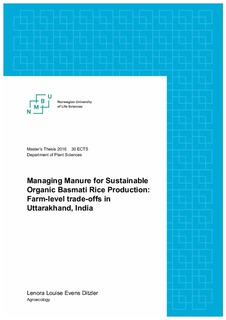| dc.description.abstract | Employing an agroecological framework, the research addressed the interconnected ecological, social and economic aspects of manure management on small-scale organic farms, investigating manure management as central to achieving the potential sustainability and livelihood benefits of organic farming. The primary objective of the work was to contribute to the advancement of knowledge around the performance dynamics, potential, and constraints of three manure management strategies (farmyard manure, vermicomposted manure, and biogas slurry produced from manure) at the farm level on smallholder, mixed, organic farms, and thereby identify opportunities for action to support farmers in the design and management of farm systems that better meet locally relevant sustainability and livelihood objectives. In order to address this objective, the case of smallholders producing organic Basmati rice in Uttarakhand, India was examined. On-farm surveys were coupled with literature review and simple systems modelling to generate integrated assessments of the sustainability of three manure management strategies at the farm level. Both vermicompost and biogas slurry were found to be improved technologies compared to farmyard manure. Vermicompost performed best on most sustainability indicator scales with the exception of yield and gross margin, where biogas slurry performed best. Improving the crop-nutritive value of manure-based fertilizers was identified as a crucial point for system improvement in the research context, implying a necessary shift in focus away from raising bulk manure inputs and towards system improvements that do not hinge on increased manure availability. Minimizing losses during handling, storage, and application were identified as important pathways to improving the crop nutritive quality of the small amount of manure fertilizers that farmers already have available. Key recommendations for reducing losses include using animal bedding, collecting urine, covering manure stockpiles with plastic sheeting, and making vermicompost when possible. Advisory support should be directed towards disseminating information on these improved manure management techniques. Future research efforts should focus on solutions for improving biogas slurry storage, since making biogas has such notable social benefits and biogas slurry will likely be the primary source of manure fertilizer for farmers making biogas. | nb_NO |
